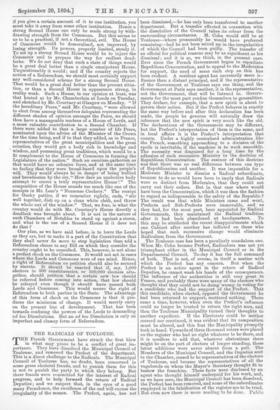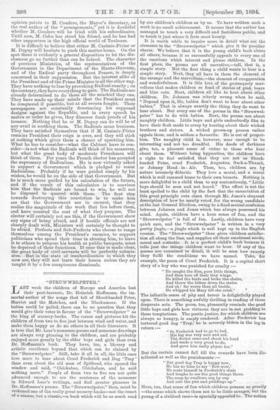THE RADICALS OF TOULOUSE. T HE French Government have struck the
first blow in what may prove to be a conflict of great im- portance. They have dissolved the Municipal Council of Toulouse, and removed the Prefect of the department. This is a direct challenge to the Radicals. The Municipal Council of Toulouse has, no doubt, been concerned in some gross electoral frauds, and to punish them for this is not to punish the party to which they belong. But these frauds were committed for the interest of Radical progress, and to help forward the return of Radical Deputies ; and we suspect that, in the eyes of a good many Frenchmen, the excellence of the end will excuse the irregularity of the means. The Prefect, again, has not been dismissed,—he has only been transferred to another department. But a transfer effected in connection with the dissolution of the Council takes its colour from the surrounding circumstances. M. Cohn would still be at Toulouse—where presumably he would have preferred remaining—had he not been mixed up in the irregularities of which the Council had been guilty. The transfer of an official for political reasons may be as significant as his dismissal; and it is so' we think, in the present case. Ever since the French Government began to repudiate Republican Concentration, and to appeal to the Moderates for support, the need of some such step as ;this has been evident. A resident agent has necessarily more it- ftuence than a distant principal, and if the representative of the Government at Toulouse says one thing, and the Government at Paris says another, it is the representative, not the Government, that will be listened to. Govern- ments for the most part confine themselves to generalities. They declare, for example, that a new spirit is about to govern their action. But if the Prefect behaves in exactly the same way before and after this declaration has been made, the people he governs will naturally draw the inference that the new spirit is very much like the old. The declarations of the Government may be different, but the Prefect's interpretation of them is the same, and in local affairs it is the Prefect's interpretation that counts. Under a highly centralised administration like the French, something approaching to a division of the spoils is inevitable, if the machine is to work smoothly. The necessity was disguised for a long time by the adhesion of each successive Ministry to the doctrine of Republican Concentration. The essence of this doctrine was that there was no real difference between one type of Republicanism and another. It was impossible for a Moderate Minister to dismiss a Radical subordinate, because to do so would have been to imply that Radicals were so distinct from Moderates, that they could not carry out their orders. But in that case where would have been the Concentration, which it was then the fashion to regard as indispensable to the safety of the Republic P The result was that while Ministers came and went, Prefects and Sub-Prefects were immovable, and as they had, for the most part, been appointed by Radical Governments, they maintained the Radical tradition after it had been abandoned at headquarters. To this may be attributed the recent disappointments which one Cabinet after another has inflicted on those who hoped that each successive change would eliminate Radicalism from the Government.
The Toulouse case has been a peculiarly scandalous one. When Mr. Cohn became Prefect, Radicalism was not yet triumphant either in the Municipal Council or in the Departmental Council. To-day it has the full command of both. That is not, of course, in itself a matter with which the Prefect has any concern. But when the Prefect is an active agent in the return of Radical Deputies, he cannot wash his hands of the consequences. The influence of the authorities is still very great in France, and probably there were many of the electors who thought that they could not be doing wrong in voting for a candidate who had the support of the Prefect. That this candidate, when elected, opposed the Government he had been returned to support, mattered nothing. There came a time, however, when even the Prefect's influence could no longer be trusted to return the right men, and then the Toulouse Municipality turned their thoughts to another expedient. If the Electorate could be neither coerced nor convinced, it was evident that its composition must be altered, and this feat the Municipality promptly took in hand. Upwards of three thousand voters were placed on the register who had no right whatever to be there, and it is needless to add that, whatever abstentions there might be on the part of electors of longer standing, these latest additions were never absent from a poll. The Members of the Municipal Council, and the Deputies sent to the Chamber, ceased to be representatives of the electors of Toulouse, and became the representatives of all the vagabonds on whom the Mayor's Secretary thought fit to bestow the franchise. These facts were disclosed by an agent who thought himself underpaid for his work, and, as we have seen, the Municipal Council has been dissolved, the Prefect has been removed, and some of the subordinates employed in the falsification of the register are to be tried. But even now there is more needing to be done. Public opinion points to M. Coudere, the Mayor's Secretary, as the real author of the "arrangements," yet it is doubtful whether M. Coudere will be tried with his subordinates. Until now, M. Cohn has stood his friend, and he has had other supporters in the high official world of Toulouse.
It is difficult to believe that either M. Casimir-Prier or M. Dupuy will hesitate to push this matter home. On the spot there is evidently a general disposition to let the dis- closures go no further than can be helped. The character of previous Ministries, of the representatives of the Government in the Department of the Haute-Garonne, and of the Radical party throughout France, is deeply concerned in their suppression. But the interest alike of the President and of the Prime Minister is all the other way. They have nothing to lose by provoking Radical enmity ; on the contrary, they have everything to gain. The Radicals are already determined to do them all the mischief they can. They have made up their minds that the President must be conquered if possible, but at all events fought. Their newspapers are constantly denouncing his supposed designs against the Republic, and in every speech he makes or order he gives, they discover fresh proofs of his treason. Nothing that he or M. Dupuy can do will be of any avail in soothing them. The Radicals mean business. They have satisfied themselves that if M. Casimir-Prier remains President their reign is over, and they will stick at nothing which gives them a chance of upsetting him. What he has to consider—what the Cabinet have to con- sider—is not what the Radicals will think of his measures, but what the great body of moderate Frenchmen will think of them. For years the French elector has accepted the supremacy of Radicalism. He is now virtually asked to support a Government which is pledged to resist Radicalism. Probably if he were guided simply by his wishes, he would be on the side of that Government. But he is much more guided by his calculation of the future, and if the result of this calculation is to convince him that the Radicals are bound to win, he will not be disposed to quarrel with them. The first step towards destroying this conviction is to make him see that the Government are in earnest, that they realise the magnitude of the work that lies before them, and have counted the cost of what they purpose. The elector will certainly not see this, if the Government show any signs of being afraid, and if hostile officials are not sharply dealt with, Ministers will certainly be thought to be afraid. Prefects and Sub-Prefects who choose to range themselves among the President's enemies, to support politicians who spend their time in abusing him, to leave it to others to propose his health at public banquets, must be deprived of their functions. If once this is made clear, the great body of civil servants will be perfectly submis- sive. But in the state of insubordination in which they now are, they will not learn their lesson unless they are taught it by a few conspicuous dismissals.







































 Previous page
Previous page